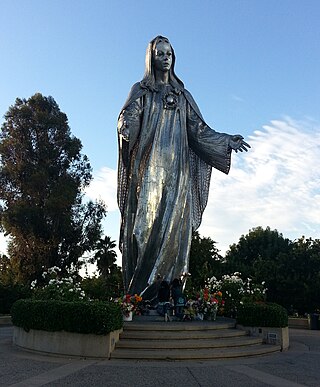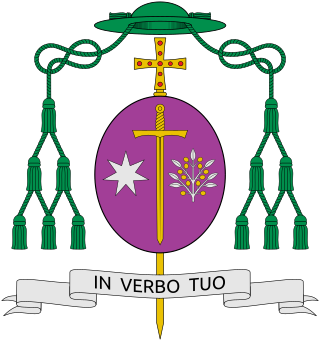
The Congregation of the Legionaries of Christ is a Roman Catholic clerical religious order made up of priests and candidates for the priesthood established by Marcial Maciel in Mexico in 1941. Maciel was also Director General of the congregation for over 60 years until forced to step down in January 2005 as a result of a child sexual abuse scandal.

José Luis Sánchez del Río was a Mexican Cristero who was put to death by government officials because he refused to renounce his Catholic faith. His death was seen as a largely political venture on the part of government officials in their attempt to stamp out dissent and crush religious freedom in the area. He was dubbed "Joselito."
Opus Dei is a personal prelature within the Roman Church that has been the subject of numerous controversies. Throughout its history, Opus Dei has been criticized by many, including by numerary members who knew the founder and had roles in Opus Dei's internal government. The reports by former members in the USA, England, Spain, Latin America, France, Germany, and other countries are published. Journalists have described it as "the most controversial force in the Catholic Church" and its founder Josemaría Escrivá as a "polarizing" figure.

The Catholic Church in Tajikistan is part of the worldwide Catholic Church in Tajikistan, under the spiritual leadership of the Pope in Rome. In 2009, the size of the community was estimated at 300 people.

Our Lady of Peace Shrine, also known as the Immaculate Heart of Mary Shrine, is a Roman Catholic shrine and landmark of the Diocese of San José, located in Santa Clara, California. The most notable feature of the parish is the 32-foot statue of Mary, Mother of Jesus.
The Oblates of the Virgin Mary is a religious institute of priests and brothers founded by Bruno Lanteri (1759–1830) in the Kingdom of Sardinia in the early 19th century. The institute is characterized by a zeal for the work of preaching and the sacrament of confession, according to the Spiritual Exercises of Ignatius of Loyola and the moral theology of St. Alphonsus Liguori. It is also marked by love for Mary and fidelity to the magisterium.
Virgilio P. Elizondo was a Mexican-American Catholic priest and community activist, who was also a leading scholar of liberation theology and Hispanic theology. He was widely regarded as "the father of U.S. Latino religious thought."

Miguel Ángel Falasca Fernández was an Argentine-born Spanish professional volleyball player and coach. He was a member of the Spain national team from 1993 to 2009, a participant in the Olympic Games Sydney 2000, and the 2007 European Champion.

The Handmaids of the Sacred Heart of Jesus is a Roman Catholic religious institute that was founded in Madrid, Spain, in 1877 by two sisters, María Dolores and Raphaela Maria Porras y Ayllon. Rafaela Maria became its first superior general in 1877 and in the same year, the congregation received papal approval. The focus of the institute is on "children's education and helping at retreats", reflected in its 130 convents in 27 countries, and the number of schools that it has founded.

Argentina has a rich history of different types of art. Throughout the centuries it has changed, and finally became what it is today.
Instituto Miguel Ángel, A.C. (IMA) is a private school in Colonia Florida, Álvaro Obregón, Mexico City. It serves preschool through senior high school.
Instituto Miguel Ángel de Occidente A.C. (IMAO) is a private school in Zapopan, Jalisco, Mexico, in the Guadalajara metropolitan area. It serves preschool through senior high school (preparatoria).

The St. Joseph's Cathedral or Latin Cathedral of St. Joseph is a Catholic cathedral located in Baghdad, the capital of Iraq.

Carlos Aguiar Retes is a Mexican cardinal of the Catholic Church who serves as the Archbishop of Mexico City. He has served as an officer of the Mexican Episcopal Conference and the Latin American Episcopal Conference (CELAM) and been president of both. He helped draft the landmark mission statement CELAM issued at the close of its 2007 conference in Aparecida. He was archbishop of Tlalnepantla from 2009 to 2017 and Bishop of Texcoco from 1997 to 2009. David Agren of the Catholic News Service calls him a "longtime ally" of Pope Francis who combines "intellectual finesse with a pastoral passion".

Víctor Manuel Fernández is an Argentine prelate of the Catholic Church and a theologian. He served as rector of the Pontifical Catholic University of Argentina from December 2009 to April 2018. He was named Archbishop of La Plata on 2 June 2018.

Joseph Vithayathil was a priest from India who has been declared as Venerable by the Catholic Church. He was born in Puthenpally, Varapuzha, Ernakulam District of Kerala State of India to Catholic parents of the Vithayathil family on 23 July 1865. He had two brothers and two sisters.

DomNuno Brás da Silva Martins, most often referred to simply as DomNuno Brás, is a Portuguese Catholic bishop and current bishop of Funchal, Madeira.

The Secular Institute of Schoenstatt Fathers (ISch) is a Catholic religious institute founded by the German Pallottine priest Josef Kentenich, as a part of the Schoenstatt Movement. It was canonically erected on 18 July 1965. It is a secular institute of pontifical right.




















